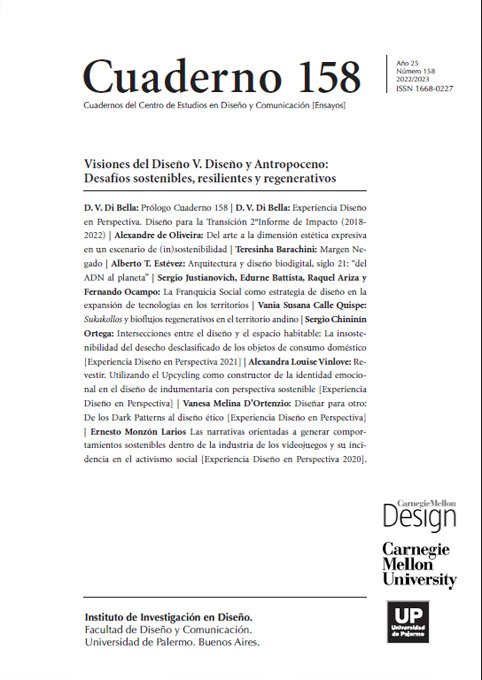Las narrativas orientadas a generar comportamientos sostenibles dentro de la industria de los videojuegos y su incidencia en el activismo social
Abstract
In recent years, the video game industry has had an impact on the environment, due to the pollution caused by the processes of development, transportation and sale of products. Actions are being carried out to mitigate these problems, by those who are participants in this industry. In addition to this, the active role and concern on the part of users regarding the problems of their environment in recent years, glimpses an opportunity to include and sensitize them through a coordinated effort, having as a central axis the design of content and communication material with narratives or storytelling aimed at the search for sustainable behavior. The vision of the future contemplates provoking an active response by generating a reaction in the behavior of users. Thus, it seeks to influence the inherent activism of the new generations, who have found in the digital environment a way that allows them to inform themselves, react and bond with what they feel connected to. Likewise, in the video game sector, the aim is to promote changes in the production, marketing and life cycle processes of products, until a unified effort is generated that impacts regulations, social, economic and health aspects.
References
Buchanan, R. (1992) Problemas perversos en el pensamiento de Disen~o. Design Issues 8(2), 5-21.
Cerda, E. (2007). Resen~a Limits to Growth: The 30-Year Update (2004). Revista Principios 144(9).
Di Bella, D. V. (2020). Impacto de la Experiencia Diseño en Perspectiva.Cuadernos Del Centro De Estudios De Diseño Y Comunicación, (80). https://doi.org/10.18682/cdc.vi80.3702
Grimble, R., y Wellard, K. (1997). Stakeholder methodologies in natural resource management: A review of principles, contexts, experiences and opportunities. Agricultural Systems, 55, 173-193.
Kirby, D. A. (2010). The Future Is Now: Diegetic Prototypes and the Role of Popular Films in Generating Real-World Technological Development. Social Studies of Science. https://www.researchgate.net/publication/249721702
Max-Neef, M., Elizalde, A., y Hopenhayn, M. (1993). Desarrollo a Escala Humana; Conceptos, aplicaciones y algunas reflexiones. Nordan-Comunidad.
ONU Programa para el desarrollo. (2020). La industria de los videojuegos inspirará a 250 millones de usuarios a proteger el planeta. UNEP. https://www.unep.org/es/noticias-y-reportajes/comunicado-de-prensa/la-industria-de-los-videojuegos-inspirara-250-millones
Oittana, L. (2013). La desaparicio´n de lo real o el e´xtasis de la comunicacio´n. Universidad Nacional de Rosario. La Trama de la Comunicacio´n,17, 255 a 269.
Peres, I. (2019) El valor de la industria de los videojuegos en 2019. Forbes. https://www.forbes.com.mx/el-valor-de-la-industria-de-los-videojuegos-en-2019/
Raposo, M. (2009). Programando por un suen~o. Centro de Investigacio´n en Entretenimiento y medios. Universidad de Palermo. https://www.palermo.edu/economicas/pdf_economicas/pdfs_centrodeentretenimientosymedios/Articulo_videojuegos_v4.pdf RPP. (2020). Estudio revela cua´l es el videojuego de consola ma´s contaminante del planeta. Progamer. https://rpp.pe/videojuegos/juegos/videojuegos-contaminacion-ambientalestudia-revela-cual-es-el-videojuego-de-consola-mas-contaminante-del-planeta-noticia-1247754
Toledo, V. (2020) Generacio´n Z, el fin del mundo tal y como lo conocemos (tesis de maestri´a). Universidad de Navarra. https://dadun.unav.edu/handle/10171/59091
Roca, G. (2012). La Sociedad Digital [video]. Youtube. http://youtu.be/kMXZbDT5vm0 Solidsworks Corporation. (2020). Gui´a de Disen~o Sostenible. https://www.solidworks.com/sustainability/
Los autores/as que publiquen en esta revista ceden los derechos de autor y de publicación a "Cuadernos del Centro de Estudios de Diseño y Comunicación", Aceptando el registro de su trabajo bajo una licencia de atribución de Creative Commons, que permite a terceros utilizar lo publicado siempre que de el crédito pertinente a los autores y a esta revista.


